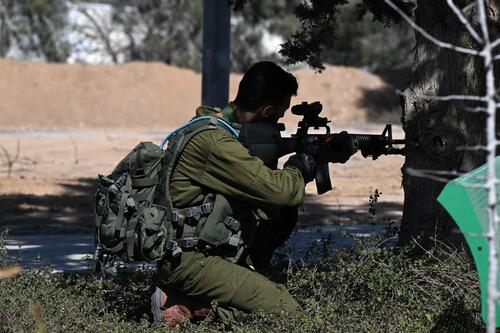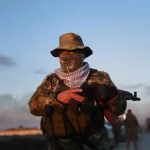
Authored by Jake Johson via Common Dreams,
The Israeli newspaper Haaretz reported days ago that Israel's military repeatedly employed a protocol known as the "Hannibal Directive" during the October 7 Hamas-led attack in an attempt to prevent the kidnapping of Israeli soldiers—even if it meant putting the lives of army captives and civilians at risk.
Haaretz found based on documents and interviews with soldiers and senior Israeli officers that Hannibal—an operational order developed in 1986 that "directs the use of force to prevent soldiers being taken into captivity" by enemy militants—was used "at three army facilities infiltrated by Hamas, potentially endangering civilians as well."

During the first hours of the Hamas-led attack, according to Haaretz, Israeli soldiers were given an order: "Not a single vehicle can return to Gaza."
"At this point, the IDF was not aware of the extent of kidnapping along the Gaza border, but it did know that many people were involved," the newspaper continued. "Thus, it was entirely clear what that message meant, and what the fate of some of the kidnapped people would be."
The full text of the Hannibal Directive has never been published. But according to a Haaretz story about the directive from more than two decades ago, part of it states that "during an abduction, the major mission is to rescue our soldiers from the abductors even at the price of harming or wounding our soldiers."
"Light-arms fire is to be used in order to bring the abductors to the ground or to stop them," it adds. "If the vehicle or the abductors do not stop, single-shot (sniper) fire should be aimed at them, deliberately, in order to hit the abductors, even if this means hitting our soldiers. In any event, everything will be done to stop the vehicle and not allow it to escape."
Israeli authorities have acknowledged "multiple incidents of our forces firing on our forces" on October 7. In April, Israel's military said that one of the hostages taken by Hamas militants during the October attack was likely killed by Israeli helicopter fire.
But the IDF, which has reportedly killed more than 38,000 people in Gaza since October 7, has declined to say whether Hannibal was used during the Hamas-led attack.
Haaretz stressed Sunday that it "does not know whether or how many civilians and soldiers were hit due to these procedures, but the cumulative data indicates that many of the kidnapped people were at risk, exposed to Israeli gunfire, even if they were not the target."
The first of the known uses of the Hannibal Directive on October 7 came "when an observation post at the Yiftah outpost reported that someone had been kidnapped at the Erez border crossing, adjacent to the IDF's liaison office," Haaretz reported.
"'Hannibal at Erez' came the command from divisional headquarters, 'dispatch a Zik.' The Zik is an unmanned assault drone, and the meaning of this command was clear," the newspaper found.
Israel applied the Hannibal directive on Oct 7. Israelis were deemed better dead than abducted: “The message conveyed at 11:22 A.M. across the Gaza Division network was understood by everyone. ‘Not a single vehicle can return to Gaza’ was the order.” https://t.co/ClcLDLrPv1
— Kenneth Roth (@KenRoth) July 7, 2024
The directive was employed at least two additional times during the attack, according to Haaretz, which cited one unnamed source in Israel's Southern Command as saying that the country's forces were instructed to "turn the area around the border fence into a killing zone, closing it off toward the west."
The newspaper continued:
One case in which it is known that civilians were hit, a case that received wide coverage, took place in the house of Pessi Cohen at Kibbutz Be'eri. Fourteen hostages were held in the house as the IDF attacked it, with 13 of them killed. In the coming weeks, the IDF is expected to publish the results of its investigation of the incident, which will answer the question of whether Brig. Gen. Barak Hiram, the commander of Division 99 who was in charge of operations in Be'eri on October 7, was employing the Hannibal procedure. Did he order the tank to move ahead even at the cost of civilian casualties, as he stated in an interview he gave later to The New York Times?
Haaretz's reporting comes weeks after a United Nations investigation concluded that the IDF "had likely applied the Hannibal Directive" on October 7, killing more than a dozen Israeli civilians.
Authored by Jake Johson via Common Dreams,
The Israeli newspaper Haaretz reported days ago that Israel’s military repeatedly employed a protocol known as the “Hannibal Directive” during the October 7 Hamas-led attack in an attempt to prevent the kidnapping of Israeli soldiers—even if it meant putting the lives of army captives and civilians at risk.
Haaretz found based on documents and interviews with soldiers and senior Israeli officers that Hannibal—an operational order developed in 1986 that “directs the use of force to prevent soldiers being taken into captivity” by enemy militants—was used “at three army facilities infiltrated by Hamas, potentially endangering civilians as well.”

During the first hours of the Hamas-led attack, according to Haaretz, Israeli soldiers were given an order: “Not a single vehicle can return to Gaza.”
“At this point, the IDF was not aware of the extent of kidnapping along the Gaza border, but it did know that many people were involved,” the newspaper continued. “Thus, it was entirely clear what that message meant, and what the fate of some of the kidnapped people would be.”
The full text of the Hannibal Directive has never been published. But according to a Haaretz story about the directive from more than two decades ago, part of it states that “during an abduction, the major mission is to rescue our soldiers from the abductors even at the price of harming or wounding our soldiers.”
“Light-arms fire is to be used in order to bring the abductors to the ground or to stop them,” it adds. “If the vehicle or the abductors do not stop, single-shot (sniper) fire should be aimed at them, deliberately, in order to hit the abductors, even if this means hitting our soldiers. In any event, everything will be done to stop the vehicle and not allow it to escape.”
Israeli authorities have acknowledged “multiple incidents of our forces firing on our forces” on October 7. In April, Israel’s military said that one of the hostages taken by Hamas militants during the October attack was likely killed by Israeli helicopter fire.
But the IDF, which has reportedly killed more than 38,000 people in Gaza since October 7, has declined to say whether Hannibal was used during the Hamas-led attack.
Haaretz stressed Sunday that it “does not know whether or how many civilians and soldiers were hit due to these procedures, but the cumulative data indicates that many of the kidnapped people were at risk, exposed to Israeli gunfire, even if they were not the target.”
The first of the known uses of the Hannibal Directive on October 7 came “when an observation post at the Yiftah outpost reported that someone had been kidnapped at the Erez border crossing, adjacent to the IDF’s liaison office,” Haaretz reported.
“‘Hannibal at Erez’ came the command from divisional headquarters, ‘dispatch a Zik.’ The Zik is an unmanned assault drone, and the meaning of this command was clear,” the newspaper found.
Israel applied the Hannibal directive on Oct 7. Israelis were deemed better dead than abducted: “The message conveyed at 11:22 A.M. across the Gaza Division network was understood by everyone. ‘Not a single vehicle can return to Gaza’ was the order.” https://t.co/ClcLDLrPv1
— Kenneth Roth (@KenRoth) July 7, 2024
The directive was employed at least two additional times during the attack, according to Haaretz, which cited one unnamed source in Israel’s Southern Command as saying that the country’s forces were instructed to “turn the area around the border fence into a killing zone, closing it off toward the west.”
The newspaper continued:
One case in which it is known that civilians were hit, a case that received wide coverage, took place in the house of Pessi Cohen at Kibbutz Be’eri. Fourteen hostages were held in the house as the IDF attacked it, with 13 of them killed. In the coming weeks, the IDF is expected to publish the results of its investigation of the incident, which will answer the question of whether Brig. Gen. Barak Hiram, the commander of Division 99 who was in charge of operations in Be’eri on October 7, was employing the Hannibal procedure. Did he order the tank to move ahead even at the cost of civilian casualties, as he stated in an interview he gave later to The New York Times?
Haaretz‘s reporting comes weeks after a United Nations investigation concluded that the IDF “had likely applied the Hannibal Directive” on October 7, killing more than a dozen Israeli civilians.
Loading…





